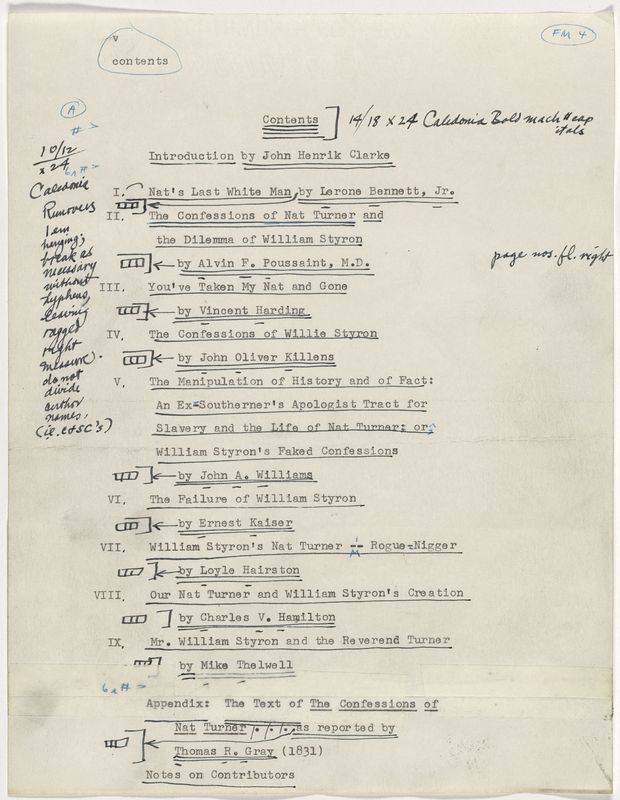Table of Contents
The contributors John Henrik Clarke invited were well-known journalists and authors (Lerone Bennett Jr., John A. Williams), academics (Alvin F. Poussaint, Vincent Harding, Charles V. Hamilton, Mike Thelwell), novelists (John Oliver Killens, Loyle Hairston), and the Schomburg Center archivist (Ernest Kaiser). Actor Ossie Davis, writer James Baldwin, and poet and activist LeRoi Jones (Amiri Baraka) declined. Clarke was keenly aware of the absence of female writers and suggested asking some women if Baldwin or Davis did not come on board. Although they did not, in the end, no female voice was included. One commissioned essay was rejected, as were two unsolicited manuscripts.
Ten essays were selected and various titles suggested for the book. Editor Arnold C. Tovell wrote to Clarke, “You must settle the vexed problem of Negro, Black, Afro-American.” Clarke decided on Black and the final title was William Styron’s Nat Turner: Ten Black Writers Respond. The book, in an appendix, presented the text of the original 1831 Confessions of Nat Turner by Thomas R. Gray.
Placing Styron’s novel into the contemporary context of the Black Power movement, Clarke wondered in the introduction, “Have they [the established press and some well-known scholars] failed to see Nat Turner as a hero and revolutionist out of fear that they might have to see H. Rap Brown and Stokely Carmichael the same way?”
Harding characterized the novel as “an exercise in domestication, assimilation, and finally destruction.” “Nat Turner, in the tradition of most black Americans, was a man of tragedy, a giant, but William Styron,” wrote Killens, “has depicted him as a child of pathos.” Bennett saw in this book “America’s ancient and manic pattern of de-balling black men,” as well as following “a pattern of de-structuring the black family and the black group.” For Kaiser, the novel was “a witches’ brew of Freudian psychology, Elkins’s ‘Sambo’ thesis on slavery and Styron’s vile racist imagination that makes especially Will and Nat Turner animals or monsters.” “If this book is important,” Thelwell concluded, “it is not so because it tells much about Negro experience during slavery but because of the manner in which it demonstrates the persistence of white southern myths, racial stereotypes, and literary clichés even in the best intentioned and most enlightened minds.”
The negation of the influence of Turner’s family—and the black community in general—on his personality, the denial of his wife’s existence, and in particular the stereotype of the black man’s “lust for white women” were recurrent themes in the writers’ contributions.
Annotated Table of Contents of William Styron’s Nat Turner: Ten Black Writers Respond, published in 1968 by Beacon Press. John Henrik Clarke Collection. Manuscripts, Archives and Rare Books Division, Schomburg Center for Research in Black Culture, The New York Public Library.
